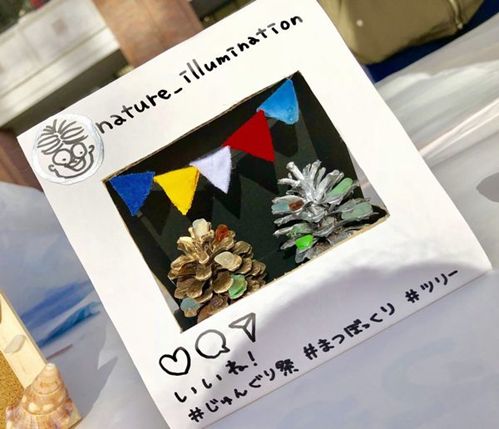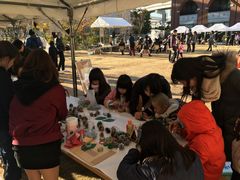April 30, 2018
Musashino University Students Educate and Inspire Others at Environmental Festival in Tokyo
Keywords: Education

At JFS we believe that environmental education has a very important role to play in sustainable society, and we know that today's youth hold the future of the world. Here we introduce an article by Ms. Yuka Anzai, a third-year student at Musashino University in Tokyo, about the "Jyunguri Festival" on December 9, 2017. This event was organized mainly by students of the Department of the Environmental Systems Sciences in the university's Faculty of Engineering. This event was part of the "Environmental Project" course in which student teams do a project and present their results. The theme this year was "Playing naturally, experiencing naturally.
The Jyunguri Festival is done as part of the "Environmental Project" course in the Department of the Environmental Systems Sciences at Musashino University. Students are encouraged to view society as a "living laboratory" for sustainability, and plan, take action and bring sustainability into reality on issues they themselves have identified. We involved and collaborated with communities, local governments, businesses, non-profit organizations, etc., assessed the outcomes, and addressed new issues. Our projects ranged widely, including reading and analyzing corporate social responsibility (CSR) reports, restoring traditional folk houses, engaging in environmental education, and more.
The festival's name Jyunguri literally means "rotation" and the festival aimed at four kinds of cycles: Traveling (traveling over time, and being able to get a feeling of traveling throughout Japan), Connecting (connecting people, and connecting to the next generation), Revolving (circulating resources to circulate society, and using community currencies to circulate the economy); and Returning (reconsidering today's excessive mass consumption and throw-away habits and return to a society that emphasizes needs and sufficiency).
The event allowed visitors to engage in environmentally friendly activities while having fun, and in the process, deepening their knowledge of the environment.
This year, about 500 visitors of various age groups enjoyed the event, including local families and high school students. Each project had its own exhibit run by students. Here are some examples: hands-on booths where parents and children enjoyed making "sea urchin lamp" (which become a social media hit); candle-making with beeswax sheets; food stands offering potage made from home-grown potatoes and sardine dumpling soup; a mini-market selling local specialties from Kagoshima and Nagano prefectures; and a stage event to learn about the environment, such as an environmental talk show with invited guests. We even had our own "community currency" circulating at the festival.

My team worked on a "space-making" project to address issues that the Earth faces by using objects that evoke awareness of environmental problems as materials to create a space. At the festival, we held a workshop on making Christmas ornaments with pinecones. To decorate the ornaments, we used sea glass (pieces of bottles and glass recovered from the beach, worn smooth by the waves). In doing so, we aimed to raise awareness of illegal dumping and other waste problems as well.
We felt a sense of achievement in the workshop, because we were able to give not only children but also adults opportunities to learn something new, like the presence and the origins of sea glass. A child also showed interest in bleached coral used for the ornaments. All in all, we were able to provide them with opportunities to think about environmental problems from various perspectives.
The festival will to be held again in the future, and I will be glad if it can provide more people with opportunities to become interested in environmental issues while having fun.
Yuka Anzai
Department of the Environmental Systems Sciences
Musashino University
Related
"JFS Newsletter"
- 'What Are the Roles of Zoos Today?' - Interview with Director of the Popular Asahiyama Zoo
- 15-Year Integrated Forest Environment Education in Shimokawa, Hokkaido to Support Sustainable Forest Management
- Fifth Contest to Award Excellent Environmental and Social Practices by Junior High, High School Students
- Locally Produced Food in School Lunches----A Challenge by Nyuzen, Japan
- Supporting 'Good Companies' that Create Future Society


